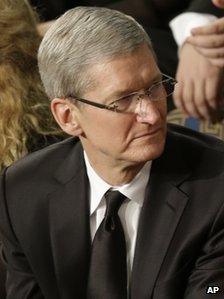Apple's Tim Cook: Shareholder lawsuit a 'silly sideshow'
- Published

Apple boss Tim Cook has called a lawsuit brought by activist shareholder David Einhorn a "silly sideshow".
But he said the board is discussing Mr Einhorn's proposal to help shareholders get a better return on their investment despite so much of the computing giant's money sitting idle in cash.
Apple already announced in March a plan to return to shareholders $45bn of the $98bn in cash reserves it then held.
Mr Einhorn unveiled last week a lawsuit aimed at returning even more value.
Despite having already repaid $10bn via dividends and share buybacks, Apple's enormous profits have swelled its cash balances even further, to $137bn.
Concentrated effort
Mr Einhorn objects to the fact that a significant percentage of his investment in Apple shares in effect sits idle, invested in cash that pays very little return.
He has accused Apple of "Depression-era mentality", by hoarding so much cash for no obvious purpose.
Apple has said that it is keeping hold of the cash so that it is ready to make a major acquisition as and when the opportunity arises.
Mr Einhorn's plan would involve Apple issuing perpetual preference shares to existing shareholders. These are a special type of share that pay a regular flat dividend in perpetuity, and which receive their payment in preference to the dividends paid out on ordinary shares.
The plan would enable to Apple to retain its cash war-chest, while letting bullish shareholders such as Mr Einhorn concentrate the value of their investment, by selling off the newly-issued preference shares.
Mr Einhorn's lawsuit aims to block plans by Apple to ask shareholders to vote on whether to abolish a contractual right that the company currently enjoys to issue such preference shares without limit.
Apple has bundled the move, together with several other changes to the way in which the company is organised, into a single voting proposition for shareholders - something that Mr Einhorn says is illegal.
"My preference is that everyone on both sides of this issue would take the money they're spending on this and donating it to a worthy cause," said Mr Cook, as he dismissed the lawsuit.
The Apple chief executive nonetheless said his company's board was in "very active discussions" over Mr Einhorn's proposal, although he still threw his weight behind the shareholder vote to abolish unlimited preference share issuance.
Mr Einhorn responded by saying Apple "could simply end the matter by complying with existing law" and letting shareholders have a separate vote on the question of preference shares.
New directions?
The spat comes at a key moment both for the US economy and for Apple.
Many economists have complained that the decision by many highly profitable big companies such as Apple to sit on the cash they earn until the economy is showing clearer signs of recovery is itself one of the main reasons why the US recovery is taking so long to gain traction.
In the case of Apple, the decision as to what to do with its cash is tied up with a broader discussion about whether the company is transforming itself from being a growth stock - a highly innovative firm that reinvests its profits in expansion and new products - into a mature company with a stable business that pays a regular dividend.
Fears that the mobile phone market may have reached saturation point have sent Apple's share price down by a third since peaking at $705 in September.
Data from research firm Gartner showed that global mobile phone sales fell last year for the first time since 2009, although the drop was led by old-fashioned devices, with sales of smartphones such as Apple's iPhone continuing to rise.
Critics of Apple say that the company has run out of investment opportunities, while the smartphone and tablet market it dominates has peaked, and is seeing tougher competition from the likes of Korea's Samsung and China's Huawei.
However, other analysts point to new potential directions for the company, including smart cars that are connected to the web, and the "iWatch" - a wrist-held tablet computer made of new malleable materials.
- Published12 February 2013
- Published8 February 2013
- Published24 January 2013
- Published24 January 2013